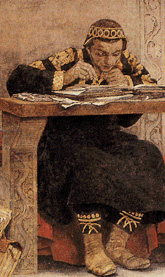| Profile | Major Works | Resources |
Irnerius of Bologna, c.1050-c.1130.

Medieval Italian jurist, nicknamed the "lamp of the law" (lucerna juris), Irnerius helped recover Roman law in the late 11th Century. Irnerius is widely regarded as founder of the University of Bologna and the father of modern Civil Law.
Up until Irnerius, the Medieval understanding of law depended primarily on the whim of the feudal lord, weakly backed up by a hodge-podge of legal traditions - customary, ordeal, Germanic, Roman, Ecclesiastical - much of it from faint memory, with only scraps and no substantive texts. Around 1070, a nearly-intact copy of Justinian's Institutes was discovered in Bologna. The Institutes was one of four books of the Corpus Juris Civilis, the compendium of Roman law assembled on order of Emperor Justinian in the 530s, but which had been lost since the Lombard conquest in the late 6th C. The other three parts of the Justinian Corpus were soon recovered - the Codex and Novellae (compilation of old and new imperial laws, which may have been known to exist before) and, most importantly, the Digest (a compilation of decisions by Roman jurists, notably the 3rd C. jurists Papian, Ulpian, Paulus and Modestinus, setting out the principles of jurisprudence, a full Greek copy of which was brought to Italy by Burgundio of Pisa). The Institutes was a commentary on the Digest, explaining these decisions, an elementary textbook for law students in Justinian's time. .
The discovery of the Institutes immediately fed into a contemporary Papal-Imperial quarrel. Countess Mathilda of Tuscany, owner of vast estates across central and northern Italy, had intended to endow her dominions to the Pope. But the Emperor, who sought those lands for himself, challenged her right to do so, citing vague Germanic custom that curtailed women's rights of inheritance and disposal. Mathilda dispatched young Irnerius, at the time probably just a clerk attached to her chancellary in Tuscany, to Bologna to study the books, to find out exactly what rights she did have. But the Justinian texts contained a swirl of legal terms and concepts, most of them unfamiliar to contemporaries. Setting himself up at Saint Stefano in Bologna (tentatively dated 1088), Irnerius dedicated himself to systematically deciphering them, and providing their definitions by glossing - i.e. writing notes in the margins.
Irnerius was not the first to comment or teach Roman law in Bologna - that honor belongs slightly earlier to a certain Pepo. But Irnerius's glossing and exposition of Roman law books was instrumental in transforming how law was understood and taught. Irnerius firmly separated law from rhetoric, and articulated it in the manner of the old Roman jurists, as a scientific discipline, related to rigorous principles and high concepts such as Justice, and not merely as a guidebook for practitioners. Students flocked to Bologna to be taught by Irnerius, forming the nucleus of what would become the Studium Generale or University of Bologna. From Bologna, emanated the first generation of trained professional jurists and administrators in Europe, that would gradually take over the jobs long performed by feudal amateurs.
Irnerius was succeeded by what has been called the Four Doctors of Bologna - Bulgarus, Martinus Gosius, Jacopus de Boragine and Hugh of Porta Ravennate. The surviving glosses of Irnerius and his successors were compiled by Accursius (Accorso di Bagnolo) in 1230.
|
Major Works of Irnerius |
|
Resources on Irnerius |
All rights reserved, Gonšalo L. Fonseca
